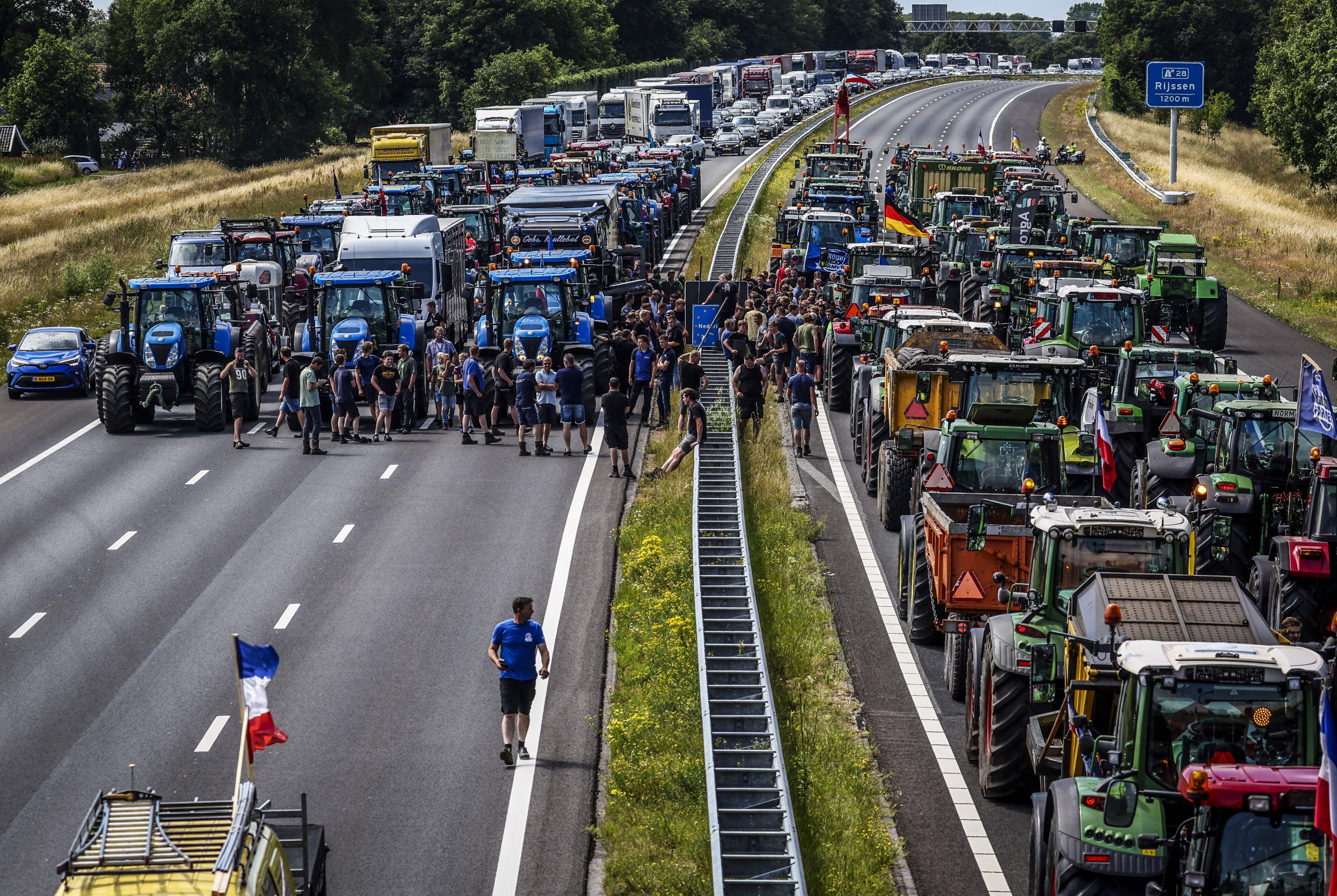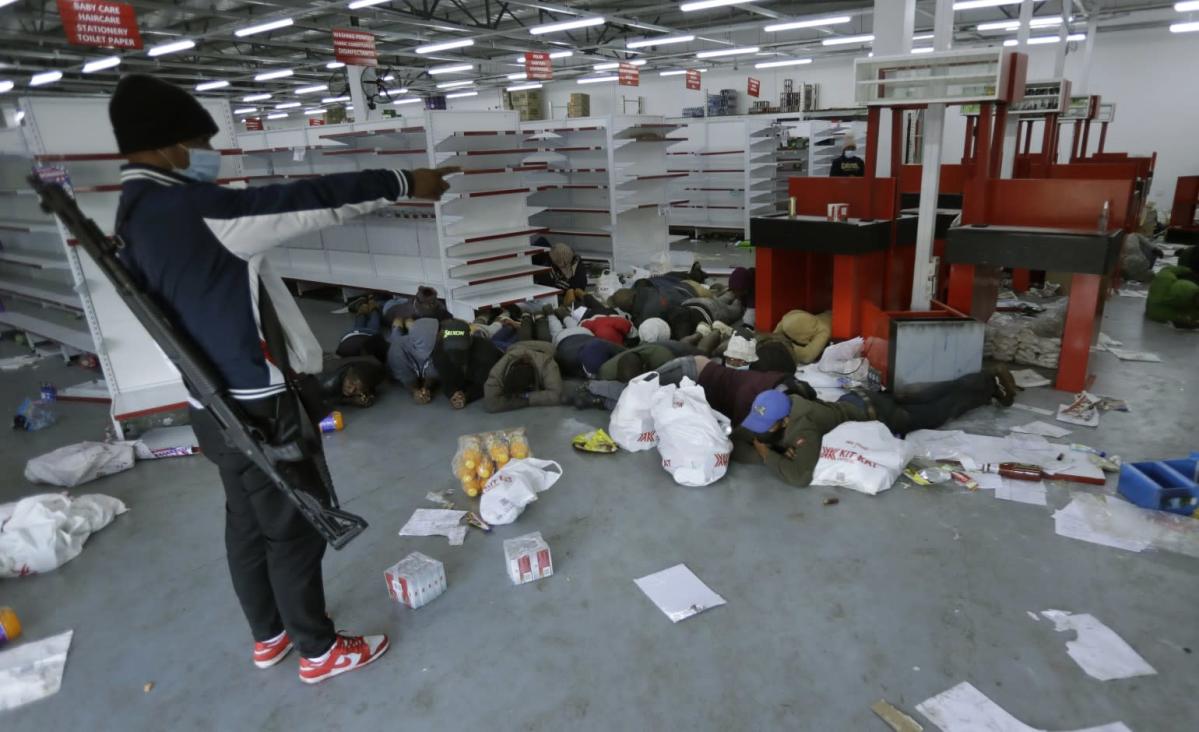munkle
Diamond Member
- Dec 18, 2012
- 5,561
- 9,700
- 2,130
Sri Lanka, Netherlands, Ghana, Poland...

 www.newsweek.com
www.newsweek.com
A popular uprising of working-class people against the elites and their values is underway—and it's crossing the globe. There is a growing resistance by the middle and lower classes against what Rob Henderson has coined the "luxury beliefs" of the elites, as everyday folks realize the harm it causes them and their communities.
There were early glimmerings last February, when the Canadian Trucker Convoy pitched working class truck drivers against a "laptop class" demanding ever more restrictive COVID-19 policies. You saw it as well in the victory of Virginia Governor Glenn Youngkin, who ran on parents' rights in education and went on to win both suburbs and rural areas. You can see it in the growing support of Hispanic voters for a Republican Party, which increasingly identifies as anti-woke, and pro-working class. And now we're seeing the latest iteration in the Netherlands in the form of a farmer's protest against new environmental rulings that will ruin them.
Over 30,000 Dutch farmers have risen in protest against the government in the wake of new nitrogen limits that require farmers to radically curb their nitrogen emissions by up to 70 percent in the next eight years. It would require farmers to use less fertilizer and even to reduce the number of their livestock. While large farming companies have the means to hypothetically meet these goals and can switch to non-nitrogen-based fertilizers, it is impossible for smaller, often family-owned farms. The new environmental regulations are so extreme that they would force many to shutter, including people whose families have been farming for three or four generations. In protest, farmers have been blockading streets and refusing to deliver their products to supermarket chains. It's been leading to serious shortages of eggs and milk, among other food items.
But the effects will be global. The Netherlands is the world's second largest agricultural exporter after the United States, making the country of barely 17 million inhabitants a food superpower. Given global food shortages and rising prices, the role of Dutch farmers in the global food chain has never been more important. But if you thought the Dutch government was going to take that into account and ensure that people can put food on the table, you would be wrong; when offered the choice between food security and acting against "climate change," the Dutch government decided to pursue the latter.
What is particularly frustrating is that the government is fully aware that what it is asking farmers to do will drive many of them out of existence. In fact, the government originally planned to move at a slower pace—until a lawsuit brought by environmental groups in 2019 forced an acceleration of the timetable.
The reaction by members of the agricultural sector has been massive and ongoing since 2019, but the onset of the COVID-19 pandemic allowed the government of Prime Minister Mark Rutte to ban protests in 2020 and 2021. With the reignited demonstrations this year, the authorities have also switched to a more aggressive approach. There have been arrests and even warning shots fired by police at farmers, one almost killing a 16-year-old protestor.
Farmers gather with their vehicles next to a Germany/Netherlands border sign during a protest on the A1 highway, near Rijssen, on June 29, 2022, against the Dutch Government's nitrogen plans.
Yet the sympathies of the Dutch are not with their government; they are solidly with their farmers. Current polls indicate that the Farmers Political Party, formed just three years ago in response to the new regulations, would gain a whopping 11 seats in Parliament if elections were held today (it currently holds just one seat). Moreover, the Dutch Fishermen's Union has publicly joined the protests, blocking harbors with fishing crews holding signs that read "Eendracht maakt Kracht": Unity Creates Strength.
But while the Dutch people are on the side of the farmers, their elites are behaving much as they did in Canada and the U.S., and not just those in government. Media outlets are refusing to even report the protests, and when they do, they cast the farmers as extremists.
Why the disconnect? Every reliable poll of European newsrooms from Germany to the Netherlands show that climate change is a much more important topic for journalists than it is for ordinary people. It's not that average citizens don't care about climate change, but that they have the common sense to know that destroying their farm so the government's emission goals can be met in 2030 instead of 2035 will not change the planet's climate.
After all, the Netherlands accounts for just 0.46 percent of the world's CO2 emissions, and while a further reduction might be desirable, it will not be decisive in combating climate change over the next eight years. It may make the country's elite to feel good about themselves, but it will also result in large parts of the population seeing their living standards decline and their economic existence targeted by the state for ideological reasons.
There is a malaise in the West currently, where ideological goals are pursued at the expense of the lower middle and working classes. Whether it's truckers in Canada, farmers in the Netherlands, oil and gas companies in the United States, ideology, not science or hard evidence, is dominating the agenda, gratifying the elites while immiserating the working class.
Ultimately, there is a risk that climate policies will do to Europe what Marxism did to Latin America. A continent with all the conditions for widespread prosperity and a healthy environment will impoverish and ruin itself for ideological reasons.
In the end, both the people and the climate will be worse off.
A Popular Uprising Against the Elites Has Gone Global

A Popular Uprising Against the Elites Has Gone Global
There is a risk that climate policies will do to Europe what Marxism did to Latin America.
A popular uprising of working-class people against the elites and their values is underway—and it's crossing the globe. There is a growing resistance by the middle and lower classes against what Rob Henderson has coined the "luxury beliefs" of the elites, as everyday folks realize the harm it causes them and their communities.
There were early glimmerings last February, when the Canadian Trucker Convoy pitched working class truck drivers against a "laptop class" demanding ever more restrictive COVID-19 policies. You saw it as well in the victory of Virginia Governor Glenn Youngkin, who ran on parents' rights in education and went on to win both suburbs and rural areas. You can see it in the growing support of Hispanic voters for a Republican Party, which increasingly identifies as anti-woke, and pro-working class. And now we're seeing the latest iteration in the Netherlands in the form of a farmer's protest against new environmental rulings that will ruin them.
Over 30,000 Dutch farmers have risen in protest against the government in the wake of new nitrogen limits that require farmers to radically curb their nitrogen emissions by up to 70 percent in the next eight years. It would require farmers to use less fertilizer and even to reduce the number of their livestock. While large farming companies have the means to hypothetically meet these goals and can switch to non-nitrogen-based fertilizers, it is impossible for smaller, often family-owned farms. The new environmental regulations are so extreme that they would force many to shutter, including people whose families have been farming for three or four generations. In protest, farmers have been blockading streets and refusing to deliver their products to supermarket chains. It's been leading to serious shortages of eggs and milk, among other food items.
But the effects will be global. The Netherlands is the world's second largest agricultural exporter after the United States, making the country of barely 17 million inhabitants a food superpower. Given global food shortages and rising prices, the role of Dutch farmers in the global food chain has never been more important. But if you thought the Dutch government was going to take that into account and ensure that people can put food on the table, you would be wrong; when offered the choice between food security and acting against "climate change," the Dutch government decided to pursue the latter.
What is particularly frustrating is that the government is fully aware that what it is asking farmers to do will drive many of them out of existence. In fact, the government originally planned to move at a slower pace—until a lawsuit brought by environmental groups in 2019 forced an acceleration of the timetable.
The reaction by members of the agricultural sector has been massive and ongoing since 2019, but the onset of the COVID-19 pandemic allowed the government of Prime Minister Mark Rutte to ban protests in 2020 and 2021. With the reignited demonstrations this year, the authorities have also switched to a more aggressive approach. There have been arrests and even warning shots fired by police at farmers, one almost killing a 16-year-old protestor.
Farmers gather with their vehicles next to a Germany/Netherlands border sign during a protest on the A1 highway, near Rijssen, on June 29, 2022, against the Dutch Government's nitrogen plans.
Yet the sympathies of the Dutch are not with their government; they are solidly with their farmers. Current polls indicate that the Farmers Political Party, formed just three years ago in response to the new regulations, would gain a whopping 11 seats in Parliament if elections were held today (it currently holds just one seat). Moreover, the Dutch Fishermen's Union has publicly joined the protests, blocking harbors with fishing crews holding signs that read "Eendracht maakt Kracht": Unity Creates Strength.
But while the Dutch people are on the side of the farmers, their elites are behaving much as they did in Canada and the U.S., and not just those in government. Media outlets are refusing to even report the protests, and when they do, they cast the farmers as extremists.
Why the disconnect? Every reliable poll of European newsrooms from Germany to the Netherlands show that climate change is a much more important topic for journalists than it is for ordinary people. It's not that average citizens don't care about climate change, but that they have the common sense to know that destroying their farm so the government's emission goals can be met in 2030 instead of 2035 will not change the planet's climate.
After all, the Netherlands accounts for just 0.46 percent of the world's CO2 emissions, and while a further reduction might be desirable, it will not be decisive in combating climate change over the next eight years. It may make the country's elite to feel good about themselves, but it will also result in large parts of the population seeing their living standards decline and their economic existence targeted by the state for ideological reasons.
There is a malaise in the West currently, where ideological goals are pursued at the expense of the lower middle and working classes. Whether it's truckers in Canada, farmers in the Netherlands, oil and gas companies in the United States, ideology, not science or hard evidence, is dominating the agenda, gratifying the elites while immiserating the working class.
Ultimately, there is a risk that climate policies will do to Europe what Marxism did to Latin America. A continent with all the conditions for widespread prosperity and a healthy environment will impoverish and ruin itself for ideological reasons.
In the end, both the people and the climate will be worse off.

